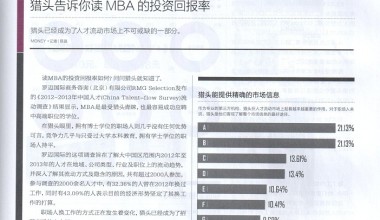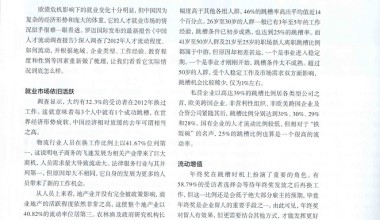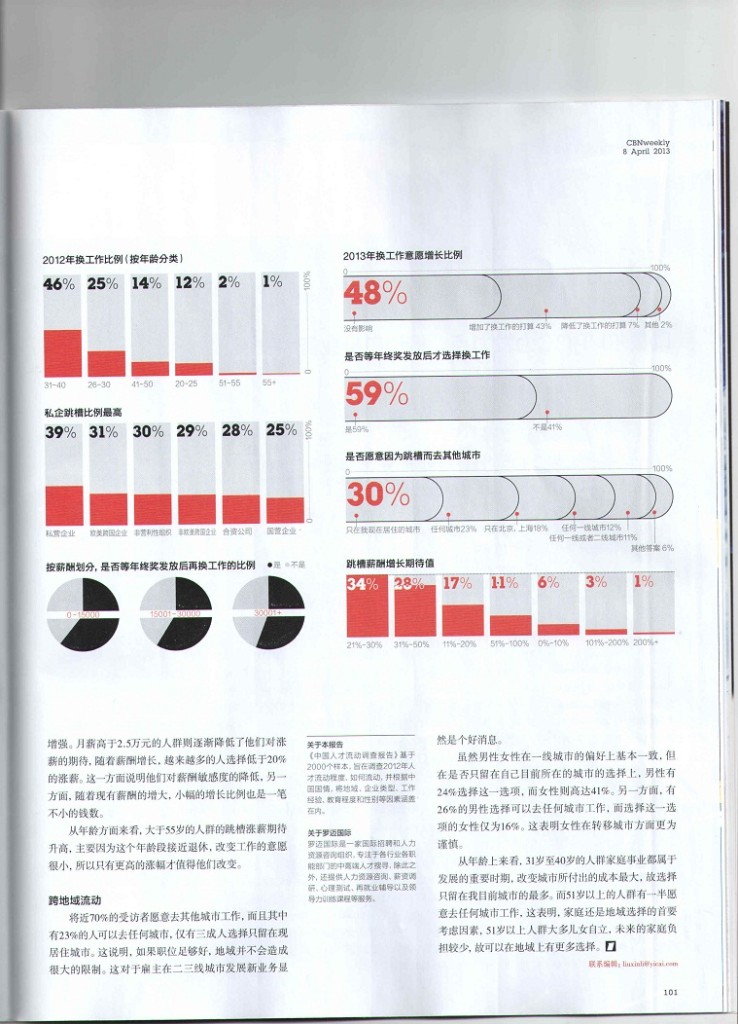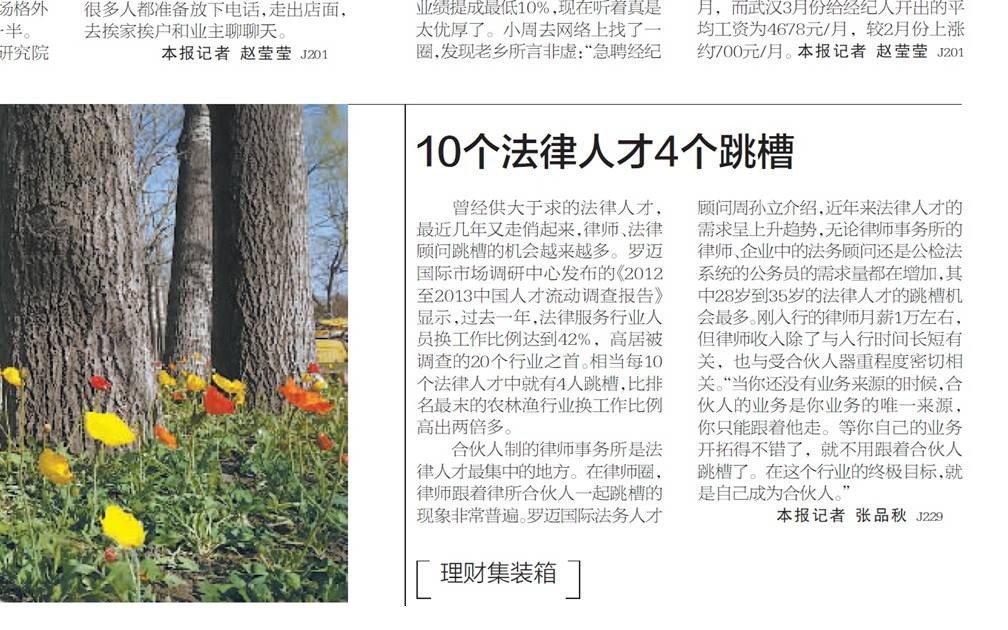To my great relief, as the owner of a recruitment firm active throughout China, 2013 is looking like it’s going to be a good year: The Europeans seem to have adverted the ‘nuclear’ scenario being touted last year of a multi-country Euro exit (there are even positive noises about Greece’s economy now); the Britons and the Germans seems to be talking sense over the EU budget; the stock markets around the world have rallied so far in 2013; Obama is pursuing a growth agenda alongside encouraging data coming out of the US and there seems to be increasingly and repeatedly positive news about the state of the Chinese economy; albeit with simmering concerns over local government debt.
We can, therefore, take comfort in the fact that there is at least some good news for the average white-collar professional working in China (unless you’re a banker), as the renewed confidence in the economy translates into greater hiring numbers; particularly in mission critical / demand-creation roles. I would expect this confidence to grow quite considerably in Q3 & 4 of 2013. So with this likely need to hire, I’d like to offer a different perspective on taking on hiring individuals who are currently not in work.
Traditionally, there has been an assumption amongst many executives that those not in work are in some way tarnished, and therefore to be avoided (I know this having talked about it to thousands of clients over the last 15 years in many different countries). An assumption that their lack of work is in somewhat related to poor performance either directly or indirectly, and ‘they’ are therefore ‘best’ avoided. Maybe a reasonable assumption in a developed economy, not so here!
Let me present to you the current scenario in mainland China, and then some reasons why it might just be the best thing you’ve ever done to hire someone who’s not working:
Firstly, the Chinese situation at present: The ratio of cost of living to income amongst affluent, educated professional people is just about the highest I have seen anywhere in the world. What I mean is this, although yes, food prices have risen of late, the cost of food, particularly when consumed in restaurants, is tiny compared to the average professional’s income. You can eat well, with wine for CNY 200, (USD 30) whereas the same would cost you 4 times that in major western cities. My car (a ‘full-sized’) costs me CNY 400 to fill up in Beijing, whereas in London my (by comparison) tiny VW Polo costs me CNY 600 to fill up (and it’s tank is half the size!). Taxes, when you factor in indirect taxation, are much lower in China than in most European countries.
You get the picture, if you don’t have an army of Children in international schools in China, the cost of living is cheap; and even more for the many Chinese who invested in down-town property developments 10-15 years ago for a 20th of the current prices, when the developers were enticing people to pool their family money (and so created a slew of dollar millionaires in the process). And then there’s the family. Chinese people are very skilled at sharing their wealth within their extended families to facilitate property purchases and other investments; there is a group attitude to wealth creation, and it often seems to have worked to many families’ advantage.
So, what does this mean for the jobs market? Well it creates a quite unique situation, on the one hand, you have a lot of people who could live very cheaply yet live in premium property, often without a mortgage, and still maintain a very nice standard of living (particularly in respect of time spent on things like fun, travel, exercise and the family etc); and yet on the other hand many of these people are skilled, highly educated and in demand in the jobs market. It’s a perfect storm in many senses, and the result is that ‘taking a career break’ becomes a perfectly acceptable thing to do, sometimes almost encouraged because the immediate need to put ‘bread on the table’ and pay the mortgage just simply isn’t there as it is in most middle-class families in the western world. The strain of ‘career-breaks’ and ‘having a rest’ on employers is compounded even more by those families who espouse the Confusionist values of ‘balance’. ‘Having a rest’, which would be an anathema to those addicted to the US-style rat-race, is quite a normal concept here, because simply put, most middle income people can afford to.
So, here’s my advice to employers, and a few reasons why hiring people who aren’t currently at work, might just be a jolly good idea: Often people with a job who look around for other jobs don’t do this for the most laudable of reasons: lack of performance, a desire to collect offers, to get a raise or obtain ‘market worth’, or simply a lack of drive or loyalty are all reasons why it might not be a good idea to hire a currently employed person. Conversely, people who aren’t currently in work are more likely to buy into the vision you offer, because, in a sense, they are starting afresh.
Do you really want someone from a competitor? Yes they might know what to do, but in my view, industry knowledge is over-rated in China, and in fact transferable-skills are more important to the modern enterprise so that people can deal with the very inevitable change when it comes. Also, if you offer a competitor’s employee more money to come and work for you, what happens when the next competitor does the same to you?
Hiring from different industry sectors brings fresh, new, valuable ideas and may prove to be much less of an ‘information security’ risk.
If people can afford to take their time over making their next career decision, then this assumes two things:
1. They have the financial means to support themselves whilst they’re doing this (and many people do because of the super-strength family organisation), which in turn assumes that money will not be the biggest deciding factor when it comes to changing jobs (good news for the employer).
2. They have a genuine interest in making a good decision about their future, and again from an employer’s perspective this is good news; we all want our staff to be there for the love of it rather than just the cash (or at least to some extent!).
Do we, as employers, want happy, healthy, relaxed staff; or do we want stressed-out, unhealthy, functioning alcoholics – aka – rat racers?! I don’t need to answer that one! I think the Chinese may well be on to something when we look at their take on life, and businesses can make the worst of it, or they can make the best of it.
China surely is a unique and special place, particularly for the jobs market. The normal rules of HR in the western world don’t seem to apply here, and therefore we have to truly think ‘outside the box’, or at least make an effort to understand ‘the box’ to generate anything like above average results!
Link to the article: http://www.businesstianjin.com/index.php?option=com_content&view=article&id=6177:hr-the-bull-is-back-why-hiring-people-currently-without-a-job-might-be-a-jolly-good-idea-&catid=184:2013-april&Itemid=100







